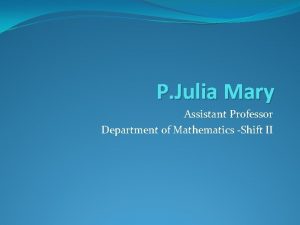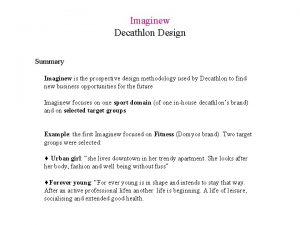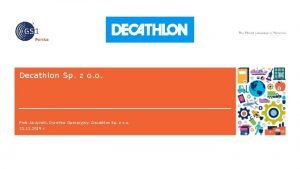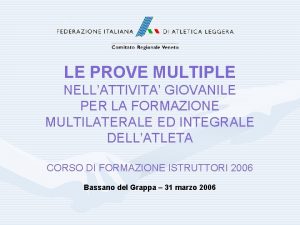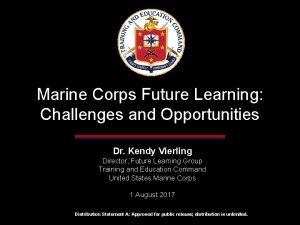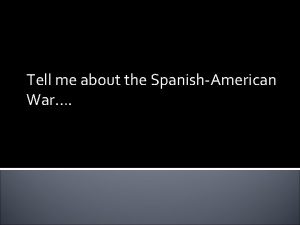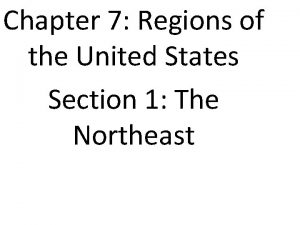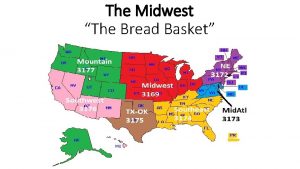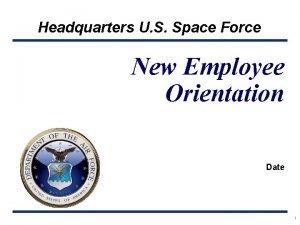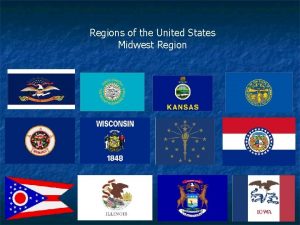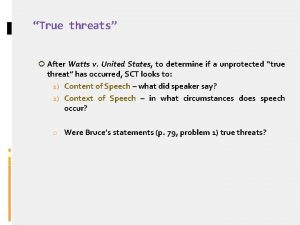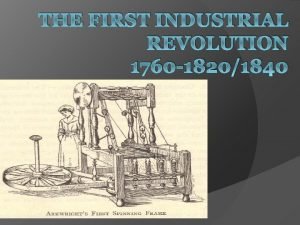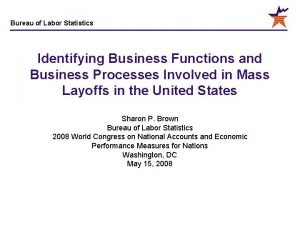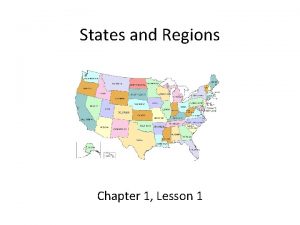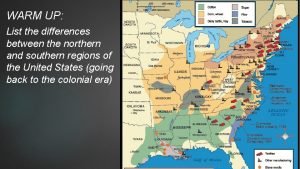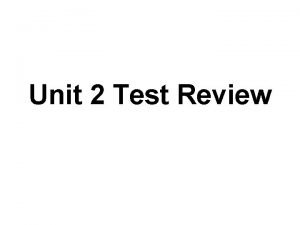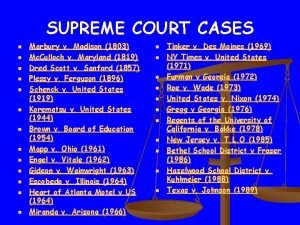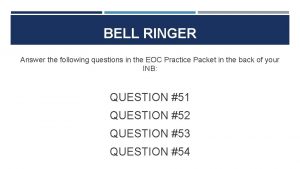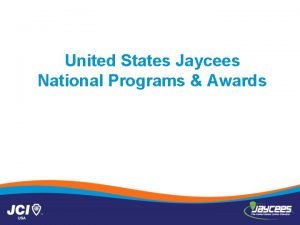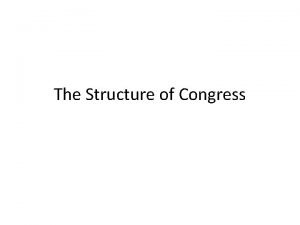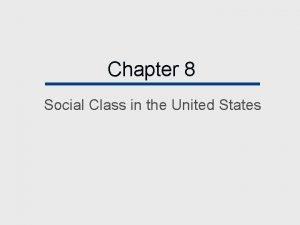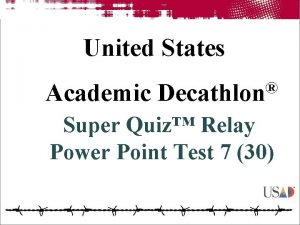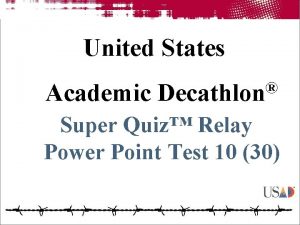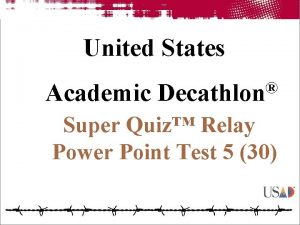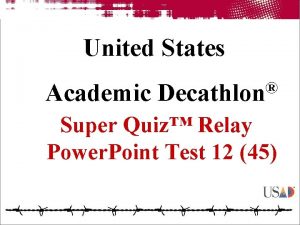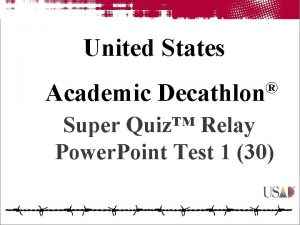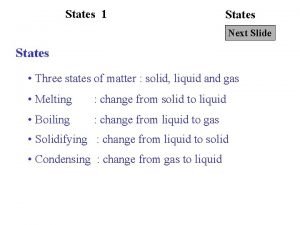Welcome to the United States Academic Decathlon orientation



















































- Slides: 51


Welcome to the United States Academic Decathlon® orientation session for interview judges. We appreciate your willingness to volunteer your time to this academic competition. The United States Academic Decathlon® program strives to provide an opportunity for high school students to experience the challenge of rigorous academic competition.

United States Academic Decathlon® Goals Promote wholesome interschool competition in academic areas of study n Stimulate intellectual growth and achievement n Encourage public awareness and interest in outstanding programs in schools n

Objective Events The United States Academic Decathlon® program provides a format in which high school students compete in many subject areas. Seven of the events are considered objective in nature and have written examinations: economics, art, literature, mathematics, science, music and social science.

Subjective Events Three events involve communication skills. Students compete in speech, interview and essay, which are referred to as subjective events.

Super Quiz™ The culmination of the competition is the Super Quiz™. It is a team relay event held before a large audience. Academic groups from each team will go on stage and collaboratively answer questions.

Team Makeup A unique aspect of United States Academic Decathlon® is that each team includes students from all academic levels. A team consists of nine students: n Three “A” students who compete in the Honor division n Three “B” students who compete in the Scholastic division n Three “C” or below students who compete in the Varsity division

Orientation Purpose The purpose of this orientation is to familiarize you with the interview event. An interview has two primary functions – to give information and to get information. In the framework of United States Academic Decathlon®, most of the interviewing process will be devoted to judges posing questions to the decathletes. It is important that the interview be as objective and consistent as possible. All students must have an equal opportunity to express themselves.

Interview Purpose While the format will have elements similar to a professional or college interview, the content of many of your questions should specifically relate to United States Academic Decathlon®. For this event, the intent is to keep the process as “contestrelated” as possible. The interview experience is designed as a teaching instrument to prepare students to present themselves in a positive manner when interviewing for a job, scholarship, or any competitive position.

Listening and Answering Skills The purpose of the interview is not only to teach students how to present themselves in a positive manner, but also to hone their listening and communication skills.

Judging Criteria The students will be judged on their ability to: 1. Present ideas and responses that are appropriate to the setting and to the questions asked

Judging Criteria 2. Listen to the comments and inquiries of the interviewers and respond with elaborate and interesting detail and vivid impressions while avoiding repetition

Judging Criteria 3. Establish and maintain rapport with members of the interview judging team through voice, gestures and attitudinal posture

Judging Criteria 4. Use voice, vocabulary and language structures appropriate to informal oral communication

Goal of Interview The goal of the interview event is to provide a setting that is conducive to the decathlete presenting himself/herself to the best of his/her ability. Remember, the students may be a little nervous and apprehensive. Put them at ease and make them feel comfortable as soon as possible.

Judging Responsibilities Interview Judge’s Responsibilities are to: n Conduct objective, consistent and uniform interviews n Create an interview atmosphere that is positive and relaxed and gives the student the opportunity to respond to the best of his/her ability

Judging Responsibilities Be personable, attentive and responsive to students’ comments. n Avoid controversy in the interview. Do not argue, interrupt or display authority that will put the student on the defensive. Do not be confrontational or argumentative. n

Judging Responsibilities n Be an active listener. Listen not only to what is being said, but observe how it is said. For example: tone of voice, vocabulary selected, facial expressions, gestures, etc.

Judging Responsibilities n Refrain from asking any questions regarding race, creed, ethnic groups, national origin/ancestry, political beliefs or affiliations, and any question that can be so construed.

Judging Responsibilities Be alert for nervousness on the part of the student and help them relax and talk. n Allow the student to complete his/her comments before moving to the next question or ending the interview. n

Judging Responsibilities KEEP ON SCHEDULE! 10 minutes per student: n 1 -minute preparation time, n 7 -minute interview time n 2 -minute evaluation time following the interview

Judging Responsibilities n After the student leaves your table, rate the student’s interview performance according to the 10 categories of communication skills listed on the official United States Academic Decathlon® interview evaluation form. Note: It is distracting to the student to be rated while he or she is speaking.

Before the Interview Begins Determine who will: n Greet the student n Explain the format of the interview

Interview Question Worksheet The judging panel will: n Select/assign interview questions to each judge prior to the first interview n Select/assign the order of questions to make sure students are judged based on the same questions

Interview Question Worksheet Questions should be selected in the following: n Six general questions n Two curriculum theme-based questions (The 2016 theme is India). For example: “What did you learn about India that you didn’t know before? ”

Interview Scantron The scoring coordinator will have pre-slugged the interview Scantron evaluation forms with each decathlete’s name and identification number, as well as the number assigned to each interview judge (1, 2 or 3). Write your name in the space for “Judge Name. ”

Judging Panel Each member of a judging panel should have one interview Scantron evaluation form for each decathlete scheduled during the interview event. Use the student identification number on the interview schedule to double check the accuracy of the interview Scantron evaluation forms. If you have a form in your packet that does not belong OR if you are missing a form for a student scheduled for your judging team, please let the interview coordinator know.

Open-ended Questions Ask predetermined, open-ended questions that cannot be answered by a “yes” or “no” response. Follow-up questions may be asked to seek clarification or to expand upon the student’s comments. Please keep these to a minimum to make sure all students are judged against the same criteria. Certain words facilitate openended responses while others encourage the opposite response.

Open and Closed OPEN What Why Where How Tell me Explain CLOSED Is Do Has Can Will Shall

Ask a Question on. . . n n n Plans following high school graduation Identifying a career/employment goal Individual and/or team preparation for the Decathlon, including how the individual and school became interested and/or involved Values that have strongly influenced the student’s life Most difficult event in the Decathlon Most influential person in the student’s life

Interview Skills Through the interview process, the individual reveals: n Problem-solving skills n Organizational skills n Analytical skills n Promotional skills

Promote the Skills When asking questions of the candidate, keep these skills in mind. Help the candidate to develop experience in answering questions that reveal these skills.

Judge 1 The head judge at each table will have the following responsibilities: n Review the scoring procedures to ensure that everyone understands n Greet each decathlete warmly as he or she approaches your table and verify ID number n Collect the interview Scantron evaluation forms

Meet and Greet Judge 1 (head judge) will warmly greet the decathlete. Using the competitor’s name, the head judge will introduce himself/herself. n Allow the student to introduce him/herself. If not forthcoming, the other judges will introduce themselves. n

As the Interview is Ending After time has elapsed (indicated by the countdown clock at the front of room): n Signal that the interview is over by thanking the student for his/her participation and wishing him/her well in the rest of the competition. n Do NOT comment specifically on the student’s performance or provide any indication of his/her score.

Collect Scantrons Stack the interview Scantron evaluation forms by student and in order of judge. Example: Student #1501: Judge 1, Judge 2, Judge 3 Student #1601: Judge 1, Judge 2, Judge 3 n Periodically, the interview Scantron evaluation forms will be collected by the interview coordinator. n

Interview Rubric

Rubric Categories Voice is the way a speaker controls volume, clarity and distinctness of voice to gain greater audibility. Voice should vary in rate, volume and pitch to engage interest, hold attention and convey self-assurance.

Rubric Categories Language Usage refers to the appropriate choice of words, proper use of grammar and correct enunciation. Language should promote clear understanding of thoughts and be appropriate for the occasion.

Rubric Categories Interpersonal Skills are measured by the student’s ability to establish rapport with interviewers. The student’s responses should correspond to and interact with the interviewers’ questions, and he/she should stimulate involvement with the interviewers.

Rubric Categories Non-Verbal Language refers to the manner in which the student uses gestures, facial expressions and physical involvement for effective communication.

Rubric Categories Manner is measured through the student’s ability to speak with enthusiasm and assurance while showing interest in the interviewers and confidence in their reactions. The student should be direct in his/her response.

Rubric Categories Listening Skills refer to the ability to analyze and interpret what is being asked. In order to answer skillfully and address the issue being considered, the student must listen carefully and attentively. The student’s responses to the questions will give an indication of his/her level of attention and ability to identify, sort and process the information being requested.

Rubric Categories Answering Skills refer to the ability to address the issue being considered, present information in a clear and concise manner, organize information in a logical and sequential order, adjust responses appropriately to a variety of audiences, and pace conversation to convey necessary information and achieve purpose. Order, logic, imagination, intelligence and other personal qualities are reflected in the way answers are given. Information presented should be relevant to the question being asked.

Rubric Categories Responses refer to the quality of the answers given. The student should reflect on the questions to provide thoughtful and insightful responses. A well thought out answer engages the interviewers’ attention and gives insight into the student’s personal qualities, skills, goals and experiences. Relevant examples and illustrations support the answers. The student should speak with certainty and conviction.

Rubric Categories Overall Effectiveness measures the nature of information provided, manner in which it was communicated, overall impression it created, and rapport established between the interviewer and candidate. Some of the questions to consider are: Did the student provide the information requested in a skillful manner? Was the information relevant and meaningful? Was the student able to achieve a positive impression of his/her skills, experiences and personal qualities?

Rubric Categories Appearance refers to the appropriate attire of the student. It should follow United States Academic Decathlon® dress standards and be appropriate for an interview.

Scoring Standard United States Academic Decathlon® has determined that ALL students at the national finals will start the interview with a score of five in each of the 10 categories. As the interview progresses, the students will gain or lose points based on their performance. n Score each student independently. n Your first student might be the best of the event. n Perfect scores MUST be exemplary. n

Volunteers are Valuable! Thanks again for your help. Without you, this event could not occur. n Enjoy yourself! n You are going to meet some amazing and impressive young people who are a tribute to our schools. n Everyone at United States Academic Decathlon® appreciates your time and energy. n

United States Academic Decathlon® THANKS YOU!

 Academic decathlon interview rubric
Academic decathlon interview rubric Carte perceptuelle decathlon
Carte perceptuelle decathlon Decathlon nit
Decathlon nit Decathlon sp z o o
Decathlon sp z o o Decathlon nc
Decathlon nc Decathlon sp zoo
Decathlon sp zoo Triathlon pentathlon eptathlon decathlon
Triathlon pentathlon eptathlon decathlon Decathlon solar charger
Decathlon solar charger Decathlon sp z o o
Decathlon sp z o o Decagon in a sentence
Decagon in a sentence Decathlon sp z o o
Decathlon sp z o o Polycentric orientation company example
Polycentric orientation company example Kendy vierling
Kendy vierling Native american tribes in the united states
Native american tribes in the united states American column & lumber co v united states
American column & lumber co v united states Awake the united states
Awake the united states What are the 7 regions of the united states?
What are the 7 regions of the united states? Who are the three creators of money in the united states?
Who are the three creators of money in the united states? The united states ought to provide a universal basic income
The united states ought to provide a universal basic income Bread basket states
Bread basket states Von thünen model
Von thünen model The united states emerges as a world power
The united states emerges as a world power Afi36-807
Afi36-807 Subtropical united states
Subtropical united states Chapter 6 human geography of the united states
Chapter 6 human geography of the united states Midwest region of the united states
Midwest region of the united states United states and canada physical map
United states and canada physical map Watts v united states
Watts v united states Why did the united states invade cuba in 1898
Why did the united states invade cuba in 1898 Expansion of the united states of america 1607 to 1853 map
Expansion of the united states of america 1607 to 1853 map What early industries mechanized in the united states?
What early industries mechanized in the united states? Soccer league hierarchy
Soccer league hierarchy What is manifest destin
What is manifest destin United states bureau of labor statistics
United states bureau of labor statistics When mr. pirzada came to dine summary
When mr. pirzada came to dine summary United states lactation consultant association
United states lactation consultant association 5 regions of united states
5 regions of united states Sectionalism map of the united states
Sectionalism map of the united states Chapter 2 free enterprise in the united states
Chapter 2 free enterprise in the united states The us center of population has moved steadily to the
The us center of population has moved steadily to the Heart of atlanta motel v. united states
Heart of atlanta motel v. united states Melting pot vs salad
Melting pot vs salad Us map 1830
Us map 1830 Preamble of us constitution
Preamble of us constitution How did these events affect the united states
How did these events affect the united states United states jaycees
United states jaycees What are the two houses of the united states congress?
What are the two houses of the united states congress? How many states canada
How many states canada What the united states has fought for
What the united states has fought for United states history and government regents
United states history and government regents Consequences of social class
Consequences of social class What states are west of the mississippi river
What states are west of the mississippi river


